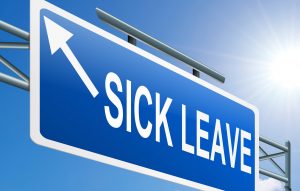 In addition to California law, San Francisco sick leave law applies to all employees who are employed within the geographic boundaries of the City and County of San Francisco by an employer. Every employee, whether exempt or non-exempt, full time or part time, permanent or temporary, who is employed in California for thirty days or longer will be entitled to accrued paid sick leave at the employee’s regular rate of pay. There is a limited number of exceptions to this coverage. The main exception is those employees who are covered by a collective bargaining agreement (union agreement) that specifically provides for accrual of sick leave.
In addition to California law, San Francisco sick leave law applies to all employees who are employed within the geographic boundaries of the City and County of San Francisco by an employer. Every employee, whether exempt or non-exempt, full time or part time, permanent or temporary, who is employed in California for thirty days or longer will be entitled to accrued paid sick leave at the employee’s regular rate of pay. There is a limited number of exceptions to this coverage. The main exception is those employees who are covered by a collective bargaining agreement (union agreement) that specifically provides for accrual of sick leave.
Sick Leave Accrual
Sick leave accrues at a rate of not less than one hour per every 30 hours worked, counting from the first day of employment. Exempt employees are deemed to work 40 hours per week, unless the employee’s normal workweek is less than 40 hours.
Employers with fewer than 10 employees can choose to cap accrual of sick leave at 48 hours per year. Employers with 10 or more employees, may cap the accrual at 72 hours.
An employee may used accrued paid sick leave starting from the 90th day of employment. This leave can be used for treatment or diagnosis of existing health condition or preventive care for an employee or an employee’s family member, i,e, child, parent, spouse, registered domestic partner, grandparent, grandchild, or sibling. Sick leave may also be use for victims of domestic violence, sexual assault, or stalking.
The law forbids requiring an employee to find a replacement employee as a condition for using sick leave.
Sick Leave Use And Pay
An employer must provide payment for sick leave taken by an employee no later than the payday of the next regular payroll period after the sick leave was taken. In other words, if you take a whole day as a sick leave and you have sufficient sick leave accrued to cover for those hours, your next paycheck covering that period should not be affected, and you should be paid the same amount as if you you didn’t take sick leave and worked as usual.
For partial days, such as using sick leave for a doctor’s appointment, an employer can require the employee to take at least one hour of sick leave, but otherwise the determination of how much sick leave is need and to be used is left to the employee exercising that right.
When Leaving The Employer
The employee is not entitled to compensation for unused sick leave days upon termination. In other words, unlike unused vacation time and PTO, which must be included in the employee’s final paycheck as part of wages, sick leave time is lost. However, if an employee leaves the employment but returns to the same place within 12 months, the accrued sick leave must be restored.
Notice Requirements
Starting July 1, 2015, employers must show, on employee’s pay stub or a separate document issued the same day as paycheck, how many days of sick leave the employee has available. The employer is also obligated to post notice of the Sick Leave Act.
Retaliation For Use of Sick Leave Illegal
Employers may not deny an employee the right to use accrued sick days, discharge, threaten to discharge, threaten to discharge, demote, suspend or otherwise discriminate against an employee for using or attempting to use sick leave law.
 San Francisco Employment Law Firm Blog
San Francisco Employment Law Firm Blog

